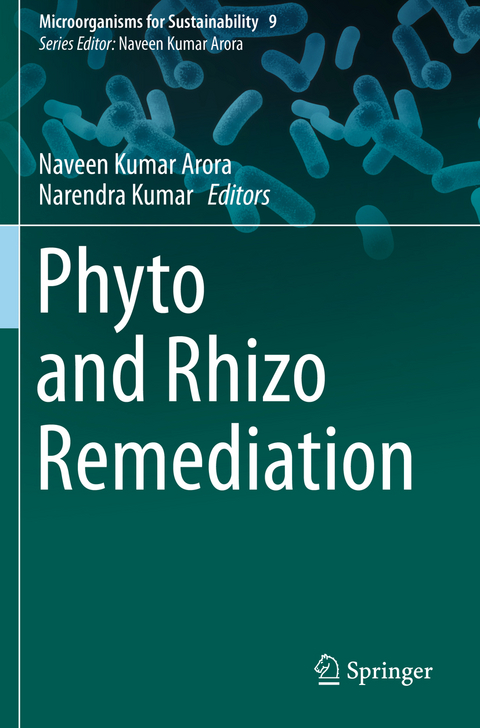
Phyto and Rhizo Remediation
Springer Verlag, Singapore
978-981-329-666-4 (ISBN)
Prof (Dr) Naveen Kumar Arora, PhD in Microbiology, Professor and Head in Department of Environmental Science, Babasaheb Bhimrao Ambedkar University (A Central University), Lucknow, Uttar Pradesh, India is a renowned researcher in the field of Environmental Microbiology and Biotechnology. His specific area of research is rhizosphere biology and plant growth promoting rhizobacteria (PGPR). He has more than 60 research papers published in premium international journals and several articles published in magazines and dailies. He is editor of 15 books, published by Springer and member of several national and international societies, in editorial board of 04 journals and reviewer of several international journals. He is also the Editor in Chief of the journal “Environmental Sustainability” published by Springer Nature. He has delivered lectures in conferences and seminars around the globe. He has been advisor to 118 post graduate and 09 doctoral students. He has also received awards for excellence in research by the Honorable Governor of Uttar Pradesh, Asian PGPR Society and Samagra Vikas Welfare Society. Although an academician and researcher by profession he has a huge obsession for the wildlife and its conservation and has authored a book, Splendid Wilds. He is President of Society for Conservation of Wildlife and is also Secretary of Society for Environmental Sustainability (website: www.ses-india.org). Narendra Kumar has obtained his M.Sc. and Ph.D degree in Environmental Science from the Babasaheb Bhimrao Ambedkar (A Central) University, Lucknow, India. Dr. Kumar, has also qualified UGC-NET in the subject Environmental Science. An active researcher with 17 years of post graduate teaching and research experience. In 2002, he joined the Department of Environmental Science, Institute of Bioscience and Biotechnology, C.S.J.M. University, Kanpur, U.P., India, as a lecturer. Dr. Kumar has been working as an Assistant Professorin the Department of Environmental Science, Babasaheb Bhimrao Ambedkar University, Lucknow since 2005. He has published more than 40 research papers and 15 book chapters with reputed National and International publishers. Five Ph.D. degree has been awarded under the supervision of Dr. Kumar and currently two research scholars are working under his guidance for doctoral degree. In addition Dr. Kumar has guided more than 40 students for their M.Sc. dissertation work. He has coedited 3 books, ‘Environmental Concerns and Sustainable Development’ in two volumes and book ‘Plant Adaptation Strategies in Changing Environment’ published by Springer Nature.
Natural and artificial soil amendments for the efficient phytoremediation of contaminated soil.- Rhizoremediation: A sustainable approach to improve the quality and productivity of polluted soils.- Phycoremediation of Pollutants for Ecosystem Restitution.- Phytoremediation of heavy metals and pesticides present in water using aquatic macrophytes.- Plant growth promoting rhizospheric microbes for remediation of saline soils.- Plant-microbe-soil interactions for reclamation of degraded soils: potential and challenges.- Lichens as sinks of airborne organic pollutants: A case study in the natural ecosystem of Himalayas.- Rhizoremediation of poly aromatic hydrocarbons (PAHs): A task force of plants and microbes.- Cadmium stress tolerance in plants and role of beneficial soil microorganisms.- Acid Tolerant Microbial Inoculants - A Requisite for Successful Crop Production in Acidic Soils.- Plant growth promoting microbes as front runners for onsite remediation of organophosphate pesticideresidues in agriculture soils.- Influence of zeolite support on integrated biodegradation and photodegradation of molasses wastewater for organic load reduction and colour removal.- An overview on the microbial degradation of linear alkylbenzenesulfonate (LAS) surfactants.
| Erscheinungsdatum | 16.01.2021 |
|---|---|
| Reihe/Serie | Microorganisms for Sustainability ; 9 |
| Zusatzinfo | 33 Illustrations, color; 14 Illustrations, black and white; X, 313 p. 47 illus., 33 illus. in color. |
| Verlagsort | Singapore |
| Sprache | englisch |
| Maße | 155 x 235 mm |
| Themenwelt | Naturwissenschaften ► Biologie ► Mikrobiologie / Immunologie |
| Naturwissenschaften ► Biologie ► Ökologie / Naturschutz | |
| Naturwissenschaften ► Geowissenschaften ► Geologie | |
| Sozialwissenschaften ► Politik / Verwaltung | |
| Weitere Fachgebiete ► Land- / Forstwirtschaft / Fischerei | |
| ISBN-10 | 981-329-666-6 / 9813296666 |
| ISBN-13 | 978-981-329-666-4 / 9789813296664 |
| Zustand | Neuware |
| Haben Sie eine Frage zum Produkt? |
aus dem Bereich


